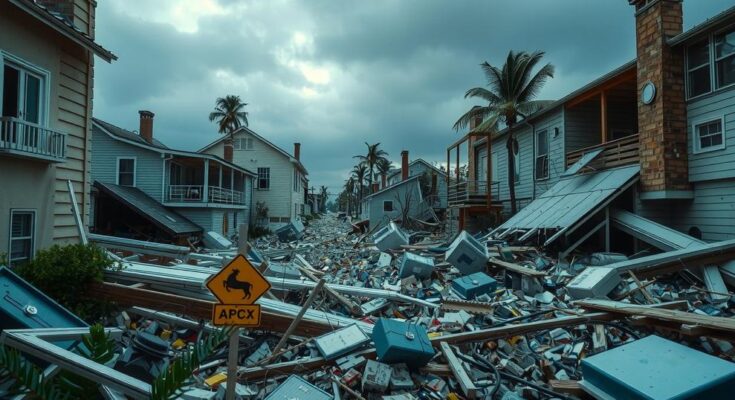The 2024 Atlantic hurricane season concluded with 11 hurricanes, surpassing the average of seven. Notable impacts included Hurricane Beryl, which was the first Category 4 to form in June; Hurricane Helene, the deadliest since Katrina; and Hurricane Milton, recording 180 mph winds. Climate change played a crucial role in the severity and timing of these storms, highlighting ongoing concerns regarding future hurricane seasons.
The 2024 Atlantic hurricane season officially concluded on Saturday, marking an eventful period that witnessed the occurrence of 11 hurricanes, significantly surpassing the usual average of seven. This season resulted in tragic loss of life and widespread destruction across the U.S. Gulf Coast and neighboring regions. Meteorologists characterized it as a “crazy busy” season due to the unprecedented warm ocean temperatures that contributed to storm formation.
Among the notable systems was Hurricane Beryl, which recorded history as the first-ever Category 4 hurricane to form in June, impacting Carriacou in Grenada and subsequently wreaking havoc in Jamaica where crop and infrastructure damage occurred alongside casualties. Shortly after, Beryl intensified into the earliest Category 5 hurricane in the Atlantic on July 1. This is atypical, as major hurricanes are generally not expected until September 1, according to the National Hurricane Center.
September brought destructive Hurricane Helene, the deadliest storm to strike the U.S. mainland since Hurricane Katrina in 2005, resulting in over 200 fatalities and significant economic losses estimated at $48.8 billion in North Carolina alone. Florida, Georgia, South Carolina, Tennessee, and Virginia also experienced substantial destruction from Helene’s impact.
In October, Hurricane Milton set records with wind speeds reaching up to 180 mph, making it one of the strongest hurricanes recorded in the Gulf of Mexico, surpassed only by Hurricane Rita in 2005. Areas affected by both Helene and Milton reported rainfall levels tripling their usual amounts for the season, with Asheville, Tampa, and Orlando experiencing their wettest two-month period on record.
November saw Hurricane Rafael nearing the record for the strongest November hurricane in the Gulf, reaching 120 mph before making landfall in Cuba, which was already recovering from Hurricane Oscar’s aftermath. This season underscored concerns regarding climate change as contributing to warmer oceans, fostering the formation of intense storms earlier and later than usual, as explained by hurricane researcher Brian McNoldy.
The Atlantic hurricane season is a period extending from June 1 to November 30, during which tropical storms typically develop in the Atlantic Ocean. Climate change, particularly the increase in greenhouse gases, has accelerated the warming of ocean waters, creating conditions conducive to more intense hurricanes. The 2024 season was characterized by unusually high sea temperatures, facilitating the formation of stronger storms and resulting in unprecedented weather patterns, which significantly impacted coastal regions and communities.
In conclusion, the 2024 Atlantic hurricane season has been marked by record-breaking hurricanes and extensive damage across several U.S. states and territories. The unprecedented intensity and frequency of these storms serve as a stark reminder of the impacts of climate change on weather patterns. As ocean temperatures continue to rise, expectations should be set for future seasons, which may yield similar or greater levels of devastation.
Original Source: www.wtvr.com




